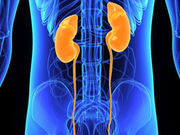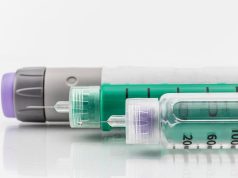Findings in patients with type 2 diabetes, chronic kidney disease over wide range of baseline eGFR
THURSDAY, Jan. 19, 2017 (HealthDay News) — For patients with type 2 diabetes and chronic kidney disease (CKD), a set of nine molecular biomarkers together with clinical risk factors enhances prediction of renal function loss, according to a study published online Jan. 11 in Diabetes Care.
Gert Mayer, M.D., from the Medical University of Innsbruck in Austria, and colleagues developed a molecular process model of CKD in diabetes using publicly available data and identified a representative parsimonious set of nine molecular markers. These were measured in baseline serum samples from 1,765 patients recruited from two trials. Estimated glomerular filtration rate (eGFR) decline was predicted based on the molecular markers, clinical risk factors, or both.
The researchers found that for patients with eGFR ≥60 and <60 mL/min/1.73 m², the variability of annual eGFR loss explained by the biomarkers was 15 and 34 percent, respectively, as indicated by the R² value, while 20 and 31 percent of variability was explained by clinical predictors, respectively. The adjusted R² value increased to 35 and 64 percent, respectively, for a combination of molecular and clinical predictors.
“A small set of serum protein biomarkers identified using a systems biology approach, combined with clinical variables, enhances the prediction of renal function loss over a wide range of baseline eGFR values in patients with type 2 diabetes mellitus and CKD,” the authors write.
AstraZeneca, Takeda Pharmaceuticals, and Keryx Biopharmaceuticals funded the two trials from which the patients were recruited.
Full Text (subscription or payment may be required)
Copyright © 2017 HealthDay. All rights reserved.








